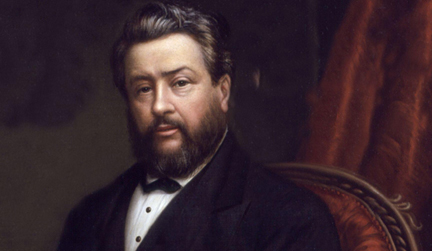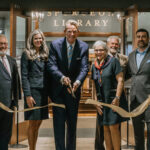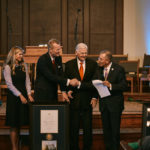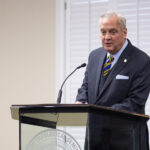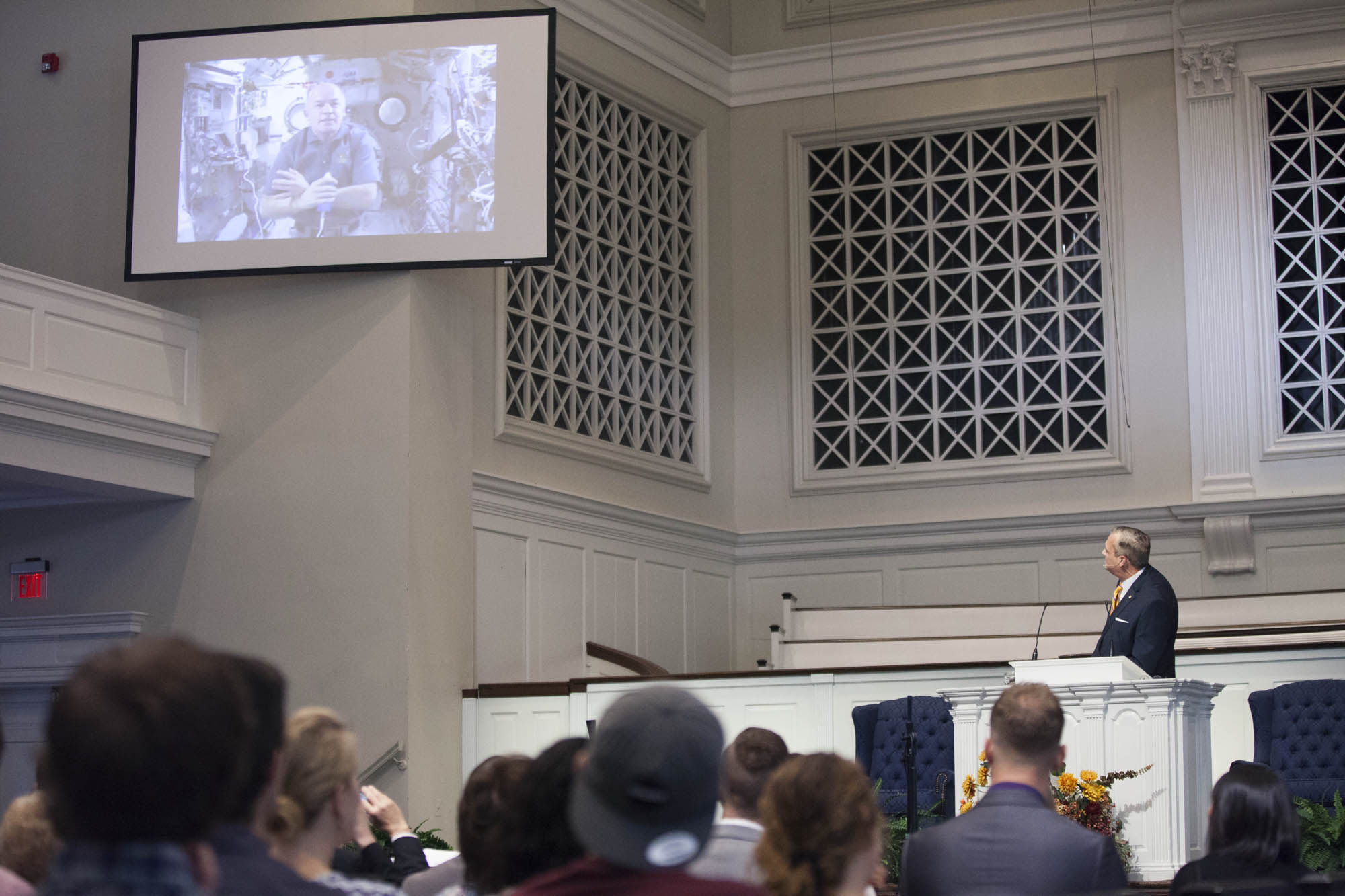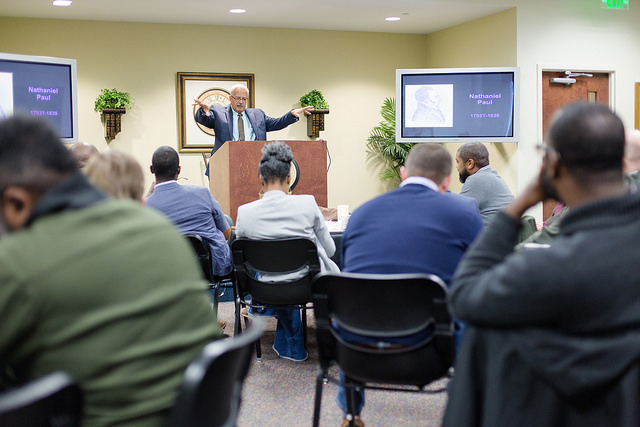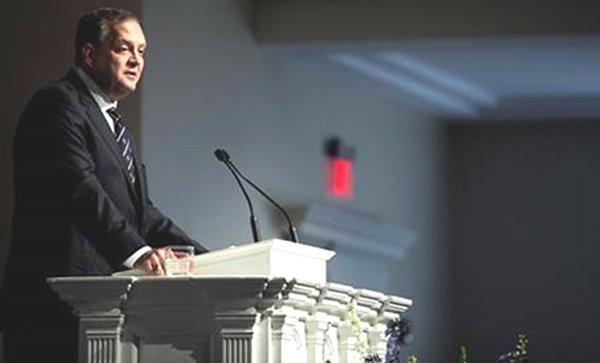
NASHVILLE (BP) — His sermons are still circulated around the world through books, pamphlets and the Internet. He is quoted by thousands of pastors each Sunday. His books are read and re-read. Church historians often say Charles Haddon Spurgeon was the prince of preachers; perhaps he still is.
Spurgeon’s influence also is felt in a broad swath of Christian higher education, with two Southern Baptist seminaries giving special attention to the late British preacher this fall.
At Midwestern Baptist Theological Seminary in Kansas City, Mo., the construction of a facility to house its Spurgeon Library and the founding of the Spurgeon Center for Biblical Preaching were announced by President Jason Allen in chapel Oct. 21.
At Southern Baptist Theological Seminary in Louisville, Ky., an Oct. 9-10 conference focused on Spurgeon’s life and ministry, led by Thomas J. Nettles, who taught historical theology at Southern more than 17 years until his retirement in May. Nettles is the author of “Living By Revealed Truth: The Life and Pastoral Theology of Charles Haddon Spurgeon.”
“The ministry of a man like Spurgeon is timeless,” said Nettles, who taught church history nearly 40 years at four schools. “His attentions and affections were focused on things that were not merely ephemeral, but were eternal. The longevity of interest in him is something that certainly commends him to all of us.”
Born in 1834, Spurgeon served as pastor of Metropolitan Tabernacle, a London megachurch, from 1854 until his death. When he died in 1892, the funeral procession snaked for five miles behind his casket.
For Midwestern, Allen said the new Spurgeon initiatives mark a “kairos moment,” with a major gift enabling the seminary to proceed with construction of a $2.5 million facility for the library and center.
The Spurgeon Library includes Spurgeon’s personal collection of more than 6,000 books and hundreds of artifacts, letters and assorted materials. Midwestern acquired the Spurgeon collection in 2006 from William Jewell College in Liberty, Mo.
“I feel like I would be under-dignifying the moment not to say with full conviction that I truly believe that God has worked in this, is working in this in a powerful way … to serve His church,” Allen said.
“When I was elected here two years ago, I immediately began to have plans, desires and prayers for what we could do with the Spurgeon Library,” he said. “Not only as a relic to the past, but as a living instrument to serve the church and to equip pastors and preachers of God’s Word.”
Christian George, curator of the Spurgeon Library, will head the Spurgeon Center. George, a Spurgeon scholar, holds a Ph.D. in theology from St. Andrews University in Scotland. Prior to arriving at Midwestern, George served at Oklahoma Baptist University for three years.
“I have been researching Spurgeon for a long time,” George said. “Without hesitation, I can tell you that this is the most significant development in Spurgeon studies in over 100 years. We believe that the Spurgeon Library and the Charles Spurgeon Center for Biblical Preaching will become a global destination — a steeple, if you will, under which scholars and students of the academy may gather but also pastors, missionaries and congregations.”
Noting that one of the center’s goals is furthering the cause of Christ as Spurgeon did, George said, “We at Midwestern believe that God is raising up future ‘Spurgeons’ who will impact this generation with the timeless truths of the Christian faith…. We at the Spurgeon Center are looking not only to Spurgeon, but through Spurgeon, to the Christ who is at the very center of our center.”
Through the center and library, Midwestern will continue its mission to be a seminary that “stands with the church and for the church,” George said.
The Spurgeon Center for Biblical Preaching will be constructed in the space that formerly served as the seminary’s chapel auditorium. The project is set to begin in late fall with the dedication slated for fall of 2015.
In an initiative called The Spurgeon Scholars, the center will offer a limited number of scholarships to full-time residential students called to pastoral ministry. They will study with George and receive writing, publishing and ministry opportunities.
Midwestern is in the process of digitizing significant portions of Spurgeon’s library, correspondence, annotations, handwritten pulpit notes and sermon galley revisions. All of the resources will be available online for viewing by the public.
Each fall, the Spurgeon Center will sponsor the Charles Spurgeon Lectures on Biblical Preaching with a goal of equipping attendees for expositional preaching. Last year, John MacArthur of Grace Community Church in Sun Valley, Calif., presented the lectures, and on Nov. 4-5, R. Albert Mohler Jr., president of Southern Seminary, will be the guest lecturer.
Allen expressed his gratitude to Bill and Connie Jenkins of Paoli, Ind., who provided the gift allowing construction to proceed.
The Jenkins “are dear friends of this institution, and the vision to build this library captivated their hearts,” Allen said. “They approached us, desiring to stand with us and support us in a special, special way. We are grateful to them and grateful to God for His dramatic provision.”
At Southern Seminary, in its two-day Alumni Academy focus on Spurgeon, Nettles delivered several lectures on Spurgeon as a pastor-theologian, his biblical preaching, his writing as a pastoral discipline, his commitment to benevolent ministry and his involvement in theological controversies.
Nettles noted key facets of Spurgeon’s early life that established the foundation for his ministry:
— Spurgeon learned to interpret his life in theological terms and all the events of his life in light of God’s providence.
— As a young teenager, he became convinced of the doctrines of grace, sometimes referred to as Calvinism, through reading volumes of the Puritans from his grandfather’s library.
— He became convinced early that Baptist teaching on the church conformed to Scripture, partly through hearing arguments from the Church of England in favor of infant baptism.
— He yearned for edifying preaching from the pulpit.
— He became convinced of the necessity of evangelism using any means possible that were faithful to the Bible.
— He had a tendency toward sickness, suffering and depression. Spurgeon was ill throughout much of his life though he often preached 10 times per week, no doubt hastening his death.
— He developed a propensity for self-analysis that allowed him to relate his personal experience, especially his well-known conversion at age 16, to others.
— He committed himself to a position of no-compromise with modernism and higher critical thought in the Baptist Union controversy of the late 19th century. Nettles unpacked Spurgeon’s role in the Downgrade Controversy toward the end of his life in which he defended biblical orthodoxy within the Baptist Union at a time when the denomination was embracing theological liberalism.
— He developed a commitment to Scripture as the final arbiter of all doctrine, teaching and practice.
One of Spurgeon’s great pleasures was training young ministers through the pastors’ college he established in London.
In that context, Spurgeon published his widely read “Lectures to My Students” and, as Nettles pointed out, outlined four evidences that a man has been called to preach God’s Word: he must have a saving experience of the Gospel; he must esteem the Gospel as glorious and worthy; he must be unable to give himself to any work other than Gospel ministry; and he must have natural gifts for preaching and teaching.
“Spurgeon believed a man whom God calls to preach the Word must have a resolute confidence in the sufficiency of Scripture and must be committed to the exposition of it,” Nettles said.
Southern Seminary professors Michael A.G. Haykin and Donald S. Whitney also lectured on topics related to Spurgeon.
Haykin, professor of church history and biblical spirituality, examined the necessity of the Holy Spirit in Christian ministry, a fundamental part of Spurgeon’s teaching. As a young man, Spurgeon encountered robust teaching on the Holy Spirit in the works of the Puritans, who taught him that without the work of the Spirit, salvation is impossible, Haykin said.
“The role of the Holy Spirit in conversion and ministry was a central theme in Spurgeon’s preaching and overall ministry,” Haykin said. “One of his best-known sermons from late in his life, called ‘The Greatest Fight in the World,’ preached with the Downgrade Controversy as the background, was on the Holy Spirit. In it Spurgeon said, ‘When the Holy Spirit is gone from a church, even truth itself becomes an iceberg.'”
Whitney, professor of biblical spirituality and associate dean of the school of theology, addressed Spurgeon’s piety, asserting that meditation on Scripture was a priority in Spurgeon’s daily walk with the Lord. Whitney called Spurgeon’s godliness a “gregarious piety” because of his virtually constant interaction with people.
“Spurgeon practiced both direct and indirect meditation,” Whitney also said. “He meditated on small phrases or brief parts of select passages and actively used his imagination in meditation.
“He meditated also indirectly in that he considered how everything conveyed biblical truth,” Whitney said. “Through this means he used a lot of simile and metaphor, which is why his sermon illustrations were brief but were also so rich.”
For more information on Midwestern’s Spurgeon Center for Biblical Preaching, visit thespurgeoncenter.com. For more information on Southern’s Alumni Academy providing free ongoing instruction for alumni and prospective students, visit events.sbts.edu.
